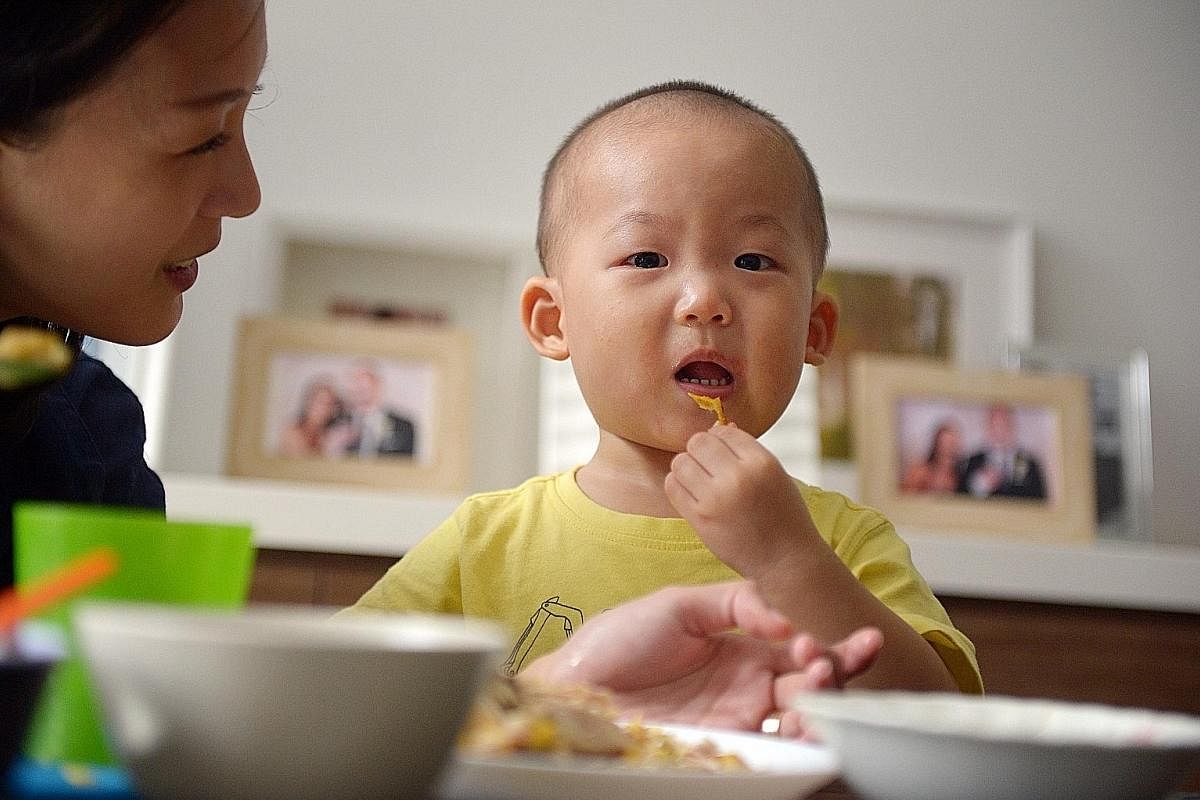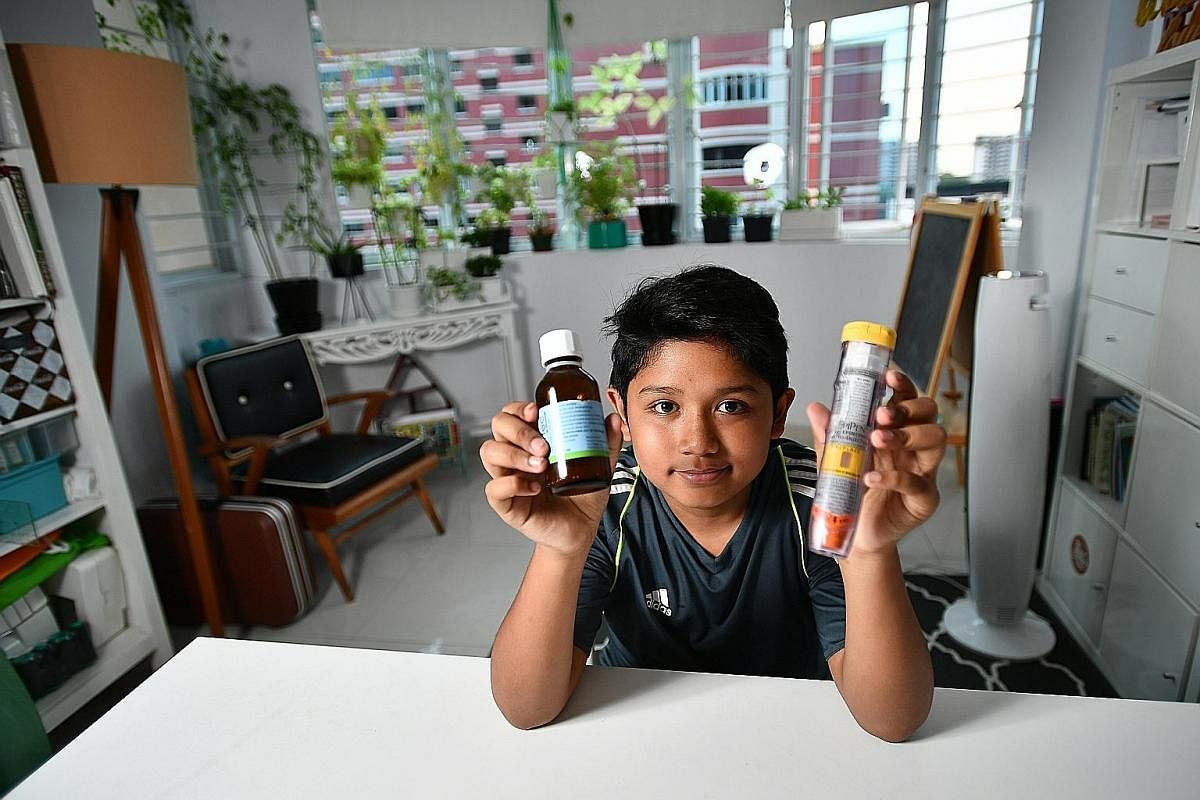-
Can kids outgrow their allergies?
-
Most children outgrow their allergies by around the age of five, says Dr Soh Jian Yi, consultant at National University Hospital's Division of Paediatric Allergy, Immunology and Rheumatology.
Those who do not can undergo treatment to manage their allergies, such as a food oral immunotherapy programme, which is available at NUH and some other hospitals and clinics. During the treatment, patients are introduced to a minuscule amount of food allergen, which is increased gradually.
When a snack can kill
Given the potentially severe reactions from food allergy in some children, families have had to make major lifestyle and dietary changes to cope


Food allergies in children have caused families to make major dietary and lifestyle changes - they say they can never be too careful - to prevent severe reactions.
Corey Yong, who is 22 months old, has several food allergies and eats home-cooked food almost exclusively as a result.
At the age of six months, he was diagnosed as being allergic to peanuts, eggs, milk and shellfish, as well as products containing any of these items. When his parents take him out, they tote containers of prepared food that is safe for him to consume.
Despite their stringent precautions, Corey experienced a severe reaction at a Chinese restaurant a few months ago.
The staff had assured his parents that the dish of steamed fish with spinach was free of his allergens - the substances that cause an allergic reaction - before they ordered it. But when the boy tasted it, his face swelled up and he developed hives all over his body within minutes, prompting his parents to take him to the hospital.
Corey's doctor later speculated that the cookware may have been used for other dishes earlier and were not washed clean of all traces of peanut oil or egg. There was no way of finding out for certain.
"I realised that you can never be too careful," says Corey's mother, Ms Amanda Chan, 37.
Earlier this month, a doctor treated a four-year-old who had a severe allergic reaction near her clinic, probably saving his life.
Being vigilant to the dangers of anaphylaxis, a serious allergic reaction that comes on quickly and may cause death, is one thing. Prevention is, of course, preferred.
Ms Chan left her banking career of 12 years at the beginning of this year to be a stay-at-home mother, so she could better focus on coping with Corey's allergies.
"I've had to put my career on hold. Corey is so young and non-communicative. His needs are more important," says Ms Chan, whose 38-year-old husband works in the construction industry. The couple also have a four-year-old son who has no allergies.
Travelling is problematic, she says. The first time Corey went on a flight earlier this year, his parents ordered meals that were free of peanuts, eggs and dairy for all four family members.
But the airline, which she declined to name, said it was not possible to tell passengers in the surrounding seats not to consume peanuts, according to Ms Chan. Corey developed hives in a slight allergic reaction after the five-hour flight to Perth, Australia, though the cause was unclear, she says.
In a separate case, Singapore Airlines said in July that it was reviewing the serving of nuts on board its flights, following an incident where a toddler had an allergic reaction to peanuts that other passengers were eating.
Dr Chiang Wen Chin is familiar with children's allergies as a paediatrician with Chiang Children's Allergy and Asthma Clinic, at Mount Elizabeth Medical Centre.
She says there has been a "palpable increase" in allergies among children in Singapore, with egg allergies being the most common.
This mirrors the rise in allergies among children in the United States and other Western societies.
Genetics, environmental factors and an obsession with excessive cleanliness have been among the reasons touted for this spike in childhood allergies, but this cannot be proven conclusively.
"We don't see the same trend in societies that are not as urbanised. Are we becoming too clean? The question is whether we go overboard when a society is urbanised, wiping out good bacteria, as well as bad bacteria," says Dr Soh Jian Yi, consultant at National University Hospital's Division of Paediatric Allergy, Immunology and Rheumatology.
Parents obviously have to teach children how to take ownership of their safety when it comes to allergies and ensure the child has the necessary medication.
But more can be done to support people with allergies, Dr Soh says.
"The child has to be taught not to accept food (with allergens) even from friends, but this may be difficult. Awareness about allergies also extends to school teachers. Sometimes, the family has to rely on the knowledge of other people, which may be lacking, such as waiters and other staff at a restaurant.
"Society as a whole should be more aware about this issue," he says, adding that, for example, restaurant menus in some Western countries contain detailed information about whether the dishes contain common allergens.
The Early Childhood Development Agency, which is in charge of the pre-school sector, recently initiated a review of the current requirements for managing food allergies among children in pre-schools, a representative of the agency says.
Ms Yasmine Chan's daughter Elyn, who is 3 1/2, attends a childcare centre full-time during the week. She wears at all times a tag on a necklace listing her allergies - peanuts, eggs and shellfish - and allergenic foods such as pandan cake, which is made with egg white.
The little girl also has an emergency kit in her bag containing a bottle of antihistamines, which is medication that eases milder allergic symptoms, and an EpiPen, a device that is used to treat severe allergic reactions.
Earlier this year, she had to use the antihistamines. A cheese biscuit she ate at the centre apparently had traces of peanuts, which caused her lips to swell to five times their usual size, and she also developed rashes all over.
Fortunately, the teachers had been trained and administered the antihistamines immediately.
Ms Chan, who also has a six-year-old son, says: "Her teachers were very vigilant, but most people will tell me that she will outgrow it and that I'm being overly anxious. But they have not seen a child with a severe allergic reaction."
When Elyn was given some egg when she was one year old, she could not breathe and passed out.
Allergic reactions can range in severity, even for the same child.
For several years, 10-year-old Mohammad Zain Abdul Hafiz had not experienced strong reactions to his allergies to dairy and tree nuts, such as cashew nuts and pistachios.
But in December last year, while staying at a hotel in Johor Baru with his family, he suffered an episode of anaphylactic shock. He had eaten a samosa at breakfast, which he thought was free of allergens, but collapsed within 10 minutes.
Luckily, his mother, corporate communications specialist Azreen Noor, 39, always books hotels that are located near hospitals in case Zain needs medical attention for his allergies when they travel. He was revived at the hospital, where he spent four days.
He carries at all times his medication kit containing antihistamines and an EpiPen, which his parents and one of his sisters, eight-year-old Noor Alya, know how to administer.
He tries to have a normal childhood in spite of his allergies. For instance, he once attended a three-day school camp, though his father had to deliver all his meals to him.
Allergies are "part of my life", says Zain.
At birthday parties, where he can have only dairy-free options and typically cannot eat the birthday cake, he has a simple solution.
He says: "I don't look at it. But I don't really like sweet stuff anyway, except cotton candy."
Join ST's Telegram channel and get the latest breaking news delivered to you.
A version of this article appeared in the print edition of The Sunday Times on October 15, 2017, with the headline When a snack can kill. Subscribe

